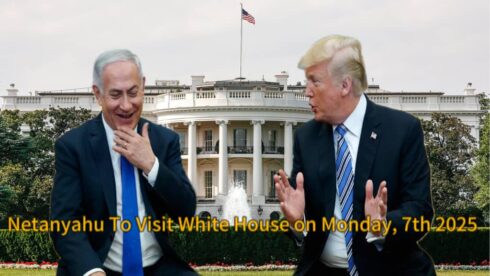Israeli Prime Minister Benjamin Netanyahu is set to make a high-profile visit to the White House on Monday, marking a significant moment in his diplomatic calendar and Israel’s international agenda. The Prime Minister’s Office confirmed the visit, stating that Netanyahu will focus on key regional security concerns and advancing Israel’s strategic interests with its closest ally.
This visit comes after several months of careful diplomatic planning and reflects Netanyahu’s intent to reassert Israel’s role as a central actor in global politics. The meeting is expected to showcase Israel’s leadership on defense and intelligence matters, while also underscoring Netanyahu’s enduring influence on international policy discourse.
Benjamin Netanyahu’s Mission Amid Surging Tensions in the Middle East
With tensions escalating across the Middle East, Benjamin Netanyahu’s visit is strategically timed to address critical security challenges. Recent rocket fire from Gaza, increasing Iranian entrenchment in Syria, and Hezbollah’s growing aggression on Israel’s northern border have sharpened Israel’s security posture.
Benjamin Netanyahu is expected to present detailed intelligence assessments and strategic recommendations to reinforce Israel’s deterrence strategy. His visit aims to secure stronger international backing against Iran and its regional proxies, reinforcing his long-standing position that Israeli national security is inextricably linked to proactive international engagement.
Benjamin Netanyahu to Spotlight Iran, Gaza, and Regional Defense Imperatives
During his discussions in Washington, Benjamin Netanyahu will place Iran’s nuclear ambitions at the forefront of the agenda. He has consistently warned of the existential threat posed by a nuclear-capable Iran and is likely to advocate for robust sanctions and heightened surveillance measures.
In addition to Iran, Netanyahu will address the humanitarian and security crisis in Gaza, emphasizing the need for targeted military responses alongside humanitarian coordination. He is also expected to promote expanded collaboration on missile defense systems, including advancements to the Iron Dome and potential co-development of next-generation technologies.
Domestic Political Turbulence Drives Netanyahu’s Global Engagement
Netanyahu’s outreach to Washington comes at a time of intense political pressure at home, with widespread protests against judicial reforms and ongoing legal proceedings dominating Israeli headlines. This visit allows him to pivot the national conversation toward foreign policy, where he continues to command substantial credibility.
Analysts suggest that Netanyahu seeks to project stability and leadership on the international stage, countering domestic criticism by positioning himself as a global statesman. His ability to navigate both domestic strife and complex foreign relations may be crucial in maintaining his governing coalition and legacy.
Netanyahu’s Vision for Israel’s Strategic Future
This visit is also part of Netanyahu’s broader vision to elevate Israel’s role in global security architecture. He is expected to outline strategic doctrines that tie Israel’s defense priorities to Western frameworks, highlighting innovation in cyber defense, intelligence operations, and multilateral military cooperation.
Netanyahu continues to champion the expansion of the Abraham Accords and normalization efforts with Gulf nations, with hopes of reigniting diplomatic momentum that has recently slowed. His discussions in Washington may lay groundwork for future breakthroughs with regional partners.
Global Stakes: Netanyahu’s Influence Beyond Israel
International observers are closely watching Netanyahu’s diplomatic moves, recognizing his enduring influence on Middle Eastern geopolitics. His visit to Washington could signal shifts in regional alliances, especially if it leads to new security frameworks or peace initiatives.
While some nations view Netanyahu’s approach as uncompromising, others see him as a necessary force in countering extremism and fostering pragmatic alliances. The outcomes of this visit could redefine Israel’s global standing and set the tone for the next phase of its foreign policy trajectory.














